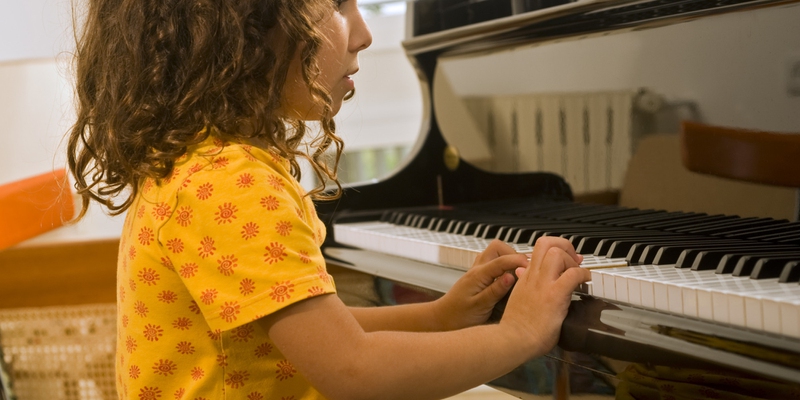If someone told you that music education is more beneficial to children than learning a second language or sport, would you believe them? An ever-growing body of research is showing that it is. We spoke to a music education expert about some of the astounding advantages of exposing children to music from birth.

Part 1
It helps brain development
“As soon as they’re born, babies use the music processing network in their brain to understand the meaning of what Mum is saying,” says Dr Anita Collins, assistant professor of music and arts education at the University of Canberra. “They interpret the melody behind her words to determine whether she’s happy, upset or angry. By exposing kids to as much music as possible from birth, we’re enhancing what is naturally there.”
Does that mean you should sign your newborn up for sax lessons? Not necessary, says Anita.
“Something as simple as bouncing a baby up and down to the beat of a piece of music is so beneficial because you’re engaging their auditory and motor cortices at the same time,” she notes. “And if you also make different facial expressions, you’ll be engaging all three areas of the brain that work together to make us the intelligent beings we are. These simple types of activities, as well as exposing children to a variety of styles of music with consistent beats, will do much more for them than those CDs that claim to help their brains grow.”
It is tied into the acquisition of language
As babies get older, they continue to use their brain’s music network to understand both spoken and written language.
“Recent studies have found that when a child is able to keep a steady beat, they have all of the correct networking in their brain to start reading,” says Anita. “It would be great if we could look at a kid and say, ‘He’s struggling to keep a beat on a drum, what if we work on that first so we know he’s really ready to read?’ We might be able to change those first couple of years of a child’s life significantly by using music as a diagnostic tool.”
It develops gross and fine motor skills
Casually exposing kids to music has many benefits, but formally learning an instrument before the age of seven is particularly valuable.
“That just means taking lessons, but it might be only for 15 minutes at a time because that’s all young kids can manage,” says Anita. “Learning a musical instrument has to be age-appropriate.”
But even those short bursts of learning can help children develop their motor skills – and so much more.
“I often explain playing an instrument as a full-brain workout,” says Anita. “Our eyes, ears, arms, legs and torso are all working at once, and so our brain is working it whole self at once. We don’t often put all those things together.”
It boosts memory
Learning to play an instrument can also improve memory because of the way the brain stores information.
“Musicians use their ears, eyes and bodies, so they store memories with multiple tags – such as visual, auditory, sensory and conceptual – in different ways and in different places in the brain,” says Anita. “When they want to retrieve a memory, it’s easier because they can do it in multiple ways. In other words, musicians make memories better, store them better and retrieve them far more quickly.”
It improves social skills
“There’s a series of processes that go on in the brain which as a group are called ‘executive function’,” Anita explains. “As an adult, I think of someone with high executive function as really approachable and easy to deal with, someone who can manage lots of things at once – those people who seem like they’re really together and are very good at interrelating socially. Musicians have been found to have much higher levels of executive function because learning music helps all the parts of the brain that are involved in it work far more effectively together.”
It enhances academic achievement
“Research that was done quite some time ago found that high-performing professionals such as CEOs and surgeons often have musical backgrounds,” says Anita. “Even if they were made to learn piano by the nuns for two years and hated it, they still get the benefits. Interestingly, it doesn’t make you use a bigger part of your brain – it’s actually the other way around. Musicians use less of their brains for a particular task, which means that the bits of the brain that aren’t active can go off and do other things at the same time.”
It teaches discipline
You might be afraid to come across as a pushy tiger mum if you sign your child up for music lessons at a young age, but the benefits will last a lifetime. “I think we’ve gone too far towards the idea that if kids don’t like it, they don’t have to do it,” says Anita. “Music makes children comfortable with discomfort. Learning is an uncomfortable place to be because it’s really hard, but when they get used to it they don’t just give up. They become willing to sit with that discomfort a bit longer until they learn how to do it. That’s why musical kids probably perform really well academically – they’re willing to struggle with an idea."
It boosts creativity
“Most people can recognise creativity, but it’s a very different set of brain synapses that makes someone actually have a creative idea,” says Anita. “Learning music helps to make creativity actually happen.”

View All Comments /Add Comment